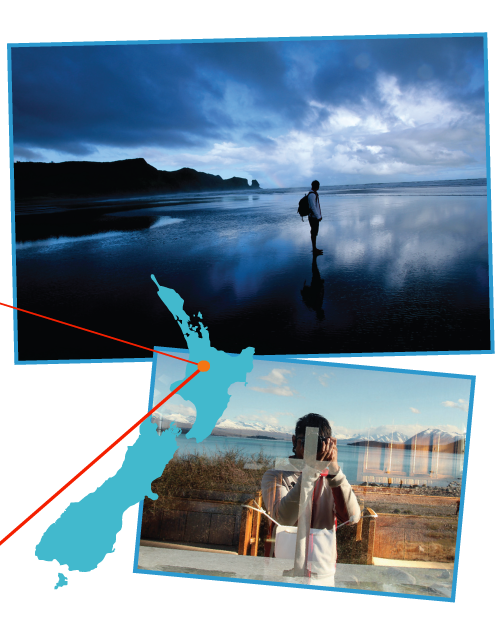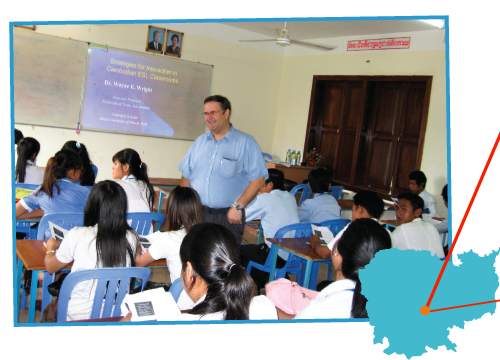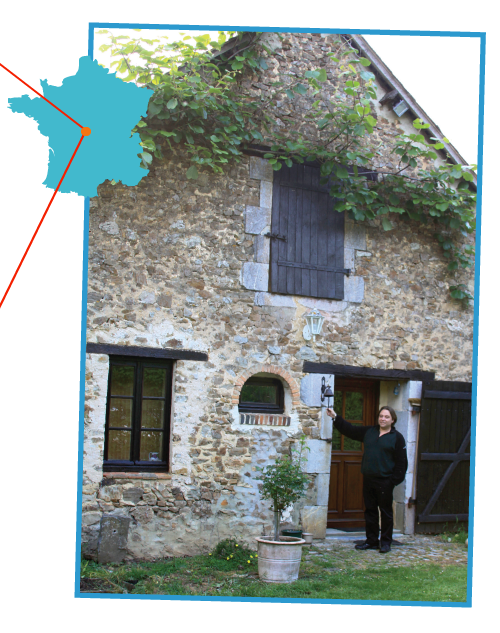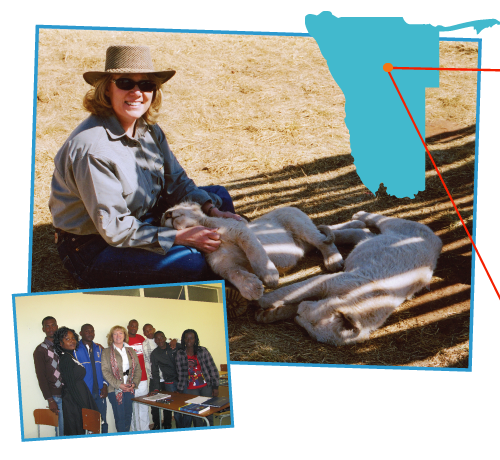Helping to rebuild an education system devastated by genocide and civil war in Cambodia. Bringing calculators to an impoverished African nation. Gaining a new world view by studying abroad. UTSA has gone global.
Roadrunners are on every continent in the world. They’re there for education, research, outreach and cultural understanding.
Last year, 202 students traveled to 28 countries for study abroad opportunities. Since 2009, dozens of faculty have traveled throughout the world for research or to lead these study abroad groups. And the university’s numerous institutes and centers provide ongoing support to countless countries in the form of lectures, economic impact studies and business support.
The numbers grow every year.
"My overarching goal is that every student graduating from UTSA will have some international component in their education," said Julius Gribou, senior international officer for the university.
That might mean spending a semester studying in another country, interacting with one of the more than 1,400 international students who attend UTSA, or taking a UTSA course that is infused with international content in its curriculum. The goal: Students should have a deeper knowledge of other countries and cultures. An international experience improves a student’s employability, Gribou said, and can teach better communication and understanding.
"A university’s role is to prepare you for a lifelong learning experience, and [an international experience] certainly would be a part of that," Gribou said. "It’s going to really make it a much broader, much richer experience."
International connections also affect faculty, he said. Collaboration with colleagues in other countries helps extend awareness of their research and can offer new perspectives.
"The broader the network you have globally, the more research has the potential to have a greater impact," he said.
In 2007, when the UTSA 2016 strategic plan was adopted, it identified globalization as a foundational theme in becoming a top tier research university. As part of the plan, this spring the university launched International Gateway, a website that provides a one-stop hub for all ongoing international activity.
And the number of agreements of cooperation with other institutions worldwide continues to grow. These allow students and faculty to seamlessly establish outreach programs at universities where UTSA already has a relationship.
It’s about global impact, Gribou said. The actions of one faculty member or one student can change thousands of lives.
In the following pages, Sombrilla highlights a few of the many students and faculty who have traveled the world to seek greater knowledge, share expertise and gain cultural understanding. Their experiences range from emotional to educational, from thrilling to humbling.
But they all agree—their lives are forever changed by the experience.

J. Patrick Lizaso spent five months in New Zealand in a study abroad program. Top: Lizaso at Bethell's Beach, New Zealand. Above: Lake Tekapo, New Zealand.
NEW ZEALAND
When J. Patrick Lizaso began writing an essay about why he wanted to study in London, he drew a blank. He was completely uninspired. He wanted an adventure, and he didn’t think London was where he would find it.
So he decided to surf through the myriad countries that offer study abroad programs. That’s when he came upon New Zealand. Abruptly, he changed his plans and flew across the world to the southwest Pacific island country. It was the best decision he could have made, he said.
"I knew I wanted to live out my dreams," he said. "It was one of the greatest times of my life."
Lizaso, a senior finance and international business major, spent five months in New Zealand. He attended the University of Auckland, one of the top 50 universities in the world. Instead of learning only about the New York Stock Exchange, as he would have by staying at UTSA, his finance classes in New Zealand taught him about the Australian Stock Exchange and the Tokyo Stock Exchange. With shorter class times than at UTSA, he had to teach himself how to thrive academically with less instruction. He had to study more. Independent learning made him a stronger student, he said.
But it wasn’t just what he studied that made his experience such an educational one. He said he learned more about himself than he ever thought possible.
"When you’re traveling, you strip everything away—family, friends, culture. You’re just there," he said. "Sometimes it’s a little scary. You find things out about yourself that you didn’t know were there."
It was his first trip outside of the U.S., and he said the experience of being in another country, hearing the ideas others had about his homeland, was humbling.
"They watch the rest of the world. They know about the world," he said. "They knew American politics, Japanese, British, South African, they knew a lot. It was good to see what everybody thought about America and form my own viewpoints from across the world."
And he found himself acting as a teacher as well. People were curious about his country and he was only too happy to correct some misperceptions.
"They are so curious about America," he said. "All they see is MTV, and in the movies all they see is people getting shot. They think that they will go to America and get shot. They also think America is all politics, and it’s not just that. They saw that as Americans, we can be just like them."
And Lizaso got his adventure. He got to skydive. He spent 17 days backpacking along South Island. He took a vacation to nearby Australia, where he sat on the beach at 5 a.m. to watch the sunrise. He turned a layover in Japan into a 16-day excursion.
"It definitely changed me," he said. "I learned to form my own viewpoints, and it made my beliefs stronger. I learned so, so much. I wouldn’t take it back at all."

Wayne E. Wright, associate professor of bicultural-bilingual studies, traveled as a Fulbright Scholar to Cambodia in 2009. The sign above the door reads "Knowledge is a treasure attached to the body."
CAMBODIA
The Cambodian genocide of the 1970s killed about 2 million people, most of whom were professional, educated, religious, sick or elderly, or ethnic minorities. Many of the country’s educators were among the dead.
"You can imagine when they were first rebuilding the universities, most of the professors had been killed," said Wayne E. Wright, associate professor of bicultural-bilingual studies. "Those that had survived had fled to other countries. A lot of the former students were in the same boat. They had to build these universities again from scratch without having the materials for the faculty, and they were doing an amazing job with what few resources they had."
Wright traveled to Cambodia in 2009 as a Fulbright Scholar charged with helping the country’s leading university, the Royal University of Phnom Penh in the capital city, to further develop its graduate degree programs. While there, he taught three courses in the master’s of education program. He also developed guidelines for the school’s graduate programs and helped master’s thesis students and faculty on research projects.
"The master’s of education program is raising the quality of education," he said. For years, the country depended on international aid in the rebuilding process for everything, including education. Slowly, that’s changing. "What’s exciting to see is, over time, more and more of the local professors and people are taking over and creating their own programs and getting the funding they need."
That same trend is happening nationwide, although even more slowly. Every sector of the country is rebuilding, from energy and human rights to infrastructure such as roads, dams and airports.
"Once the people have the research skills, they themselves are able to analyze the problems, come up with solutions, try them out, evaluate them to make sure they’re working properly and make adjustments as they need," Wright said. "They’ll make a lot more progress in developing the country."
Wright’s interest in the devastated region began when he was 19. In 1986, he spent two years in Washington, D.C., serving as a Mormon missionary with the Cambodian refugee population. When he returned home to Long Beach, Calif., he discovered that the city had the largest Cambodian population outside of Cambodia in the world. He became a paraprofessional teacher, helping in Cambodian classrooms, then received a degree in bilingual education. Soon after, he moved to Cambodia and lived there for almost two years working as a volunteer in the education and human rights sectors through a USAID-funded project.
There Wright met his wife, Phal. After he returned to the U.S., he worked for five years as a bilingual teacher for Cambodian students. He went on to earn a Ph.D. in educational leadership and policy studies at Arizona State University, focusing on language and education policies and programs for language minority students. When he moved to UTSA, he found out about the chance to return to Cambodia through the Fulbright program. It was a perfect match.
Wright said he’s impressed by the resilience of the Cambodian people. "It’s just horrible the traumatic things that they had experienced, and yet they always smiled," he said. "Then they were really willing and anxious to rebuild their lives in a new country."
His experience in Cambodia has changed his worldview, he said.
"I’ve been able to develop empathy to see how other people experience life and see the world. I think I’m a little more critical in terms of the issues that we deal with in this country, especially a lot of the political debates that come down to sound bites where problems aren’t looked at through the perspective of others," he said. "And to see the kind of suffering people have gone through and how much that can destroy a society but at the same time how a people can rebound from something so tragic and so horrible and return to life as normal as possible. That changes you."

Frederick Courtois '10 stands in front of an old farmhouse that was converted into an office called Monthermont, located in the Mayenne area west of Le Mans, France. The house was built in the 18th century.
FRANCE
Studying abroad changed Frederic Courtois’ life.
The three months he spent in France last year gave him more than the opportunity to finish the second of two required practicums for his master’s in social work. It also gave him a job in his native country.
"This was very important for me," he said. "It allowed me to reconnect with my own country. It’s strange what happens through a university."
Courtois grew up in France, but left there to live in Mexico when he was a teenager. He hadn’t been back in 23 years.
"It was a huge reeducation into my own country," he said. "I had to relearn how to communicate effectively with my own people. I identified with the Mexican culture and American culture and this presented a real challenge in the context of social work in France."
For his practicum, Courtois launched a program to provide shelter to homeless people who have dogs as pets. Because most shelters in France don’t accept animals, these people were left in the streets with no help.
"It went really well," he said. "I had quite a bit of freedom to select different approaches. I started with straight outreach, identified the needs of the individuals, and adapted interventions based on their needs. I then collaborated with other social service partners in the area to identify housing and services for them as soon as we could."
When he was done with his practicum, he returned to UTSA and graduated in December. Despite a competitive job market in France, he found a job right away. He now works with Sauvegarde de la Mayenne et Sarthe near Le Mans, about two hours southwest of Paris. He manages a five-month intensive program that serves as an alternative to incarceration for 14- to 18-year-old males.
"We take the youths to a remote isolated area and engage with them in activities like sports, community service and psychotherapy as a means to forge a group, reconnect broken bonds with their families and restore a sense of belonging," he said.
Courtois was the first student from the Department of Social Work to do an international field placement. He said the experience was invaluable, as were the UTSA professors who helped him along the way.
"Right now with the economic situation in the U.S., it is very difficult to find a job in social services," he said. "To do my practicum at the time I did in France and be able to perform adequately in their eyes certainly helped me to find a job quicker than it would have gone otherwise."

Top: Kathleen Mittag, professor of math and statistics, sits with white lion cubs in South Africa in 2006. Above: Mittag with pre-service math teachers in Namibia in 2010.
NAMIBIA
When Kathleen Mittag traveled with her husband to South Africa for a vacation, she decided to take a tour of local schools. That’s when she saw a classroom of 90 kindergarten students crammed into a boxcar.
"That had to be, I would say, the worst-funded school I have ever seen," said the UTSA math and statistics professor. "The classroom was in a container like you see on a railroad car or on the backs of 18-wheelers. That’s where the class was. A container. They needed so much."
So she gave the school a box of old calculators that had been sitting in her garage. For the African students, it was a gift of technology they had never before seen. For Mittag, it was the beginning of a six-year relationship with the continent.
Mittag has been back to Africa twice since then, mainly at her own expense, to hand out more calculators and teaching supplies and to conduct research. In 2010, she traveled to Namibia to meet with pre-service teachers and observe their teaching styles. It’s part of a study comparing the math skills of teachers in Africa and teachers in the U.S.
What she’s seen so far is that teachers and students are the same throughout the world, she said. In Africa, she has seen an unwavering determination on the part of the educators to teach, and a yearning on the part of the students to learn.
"A teacher has to be dedicated, and these teachers are dedicated just like the teachers we have in the U.S.," she said. "They face the same problems we face. We face kids from broken homes, they face kids from broken homes. We face kids with low socioeconomic [levels], they definitely have low socioeconomic [levels]. We all have the same struggles. And the kids are the same everywhere, too. They all want to learn when they come into school."
Although traveling to Africa began as recreation, Mittag said her mission has changed. She has already learned so much about the people and the education system, and she wants to know more. Eventually, she’d like to travel to China and regions of South America to compare the education systems there.
"I’d like to see how students are learning [around the world] and compare it to here," she said. But already, she has a hypothesis. "I think it’s going to be the same everywhere. It’s a matter of money but also it’s a matter of the dedication of the teachers and the students. The parents or guardians also have a role. It’s a group project, basically."
She’s been changed by her experiences, she said.
"It did open my eyes to the circumstances that some of the kids have, and they still have wonderful attitudes and they are still learning and they want to learn," she said. "It’s been a rewarding experience. And I’ll go back."

